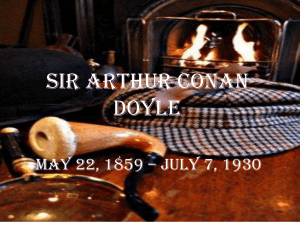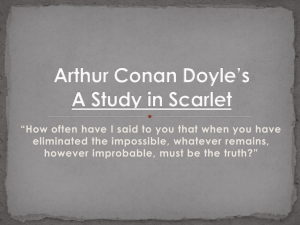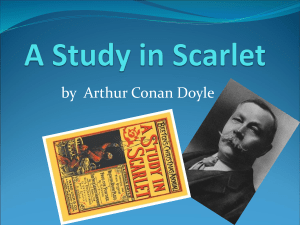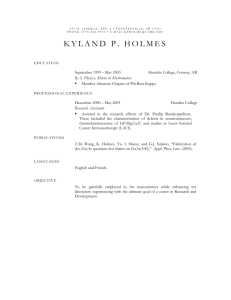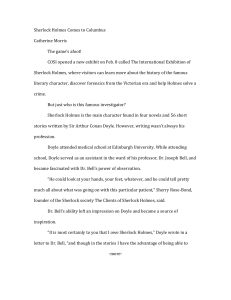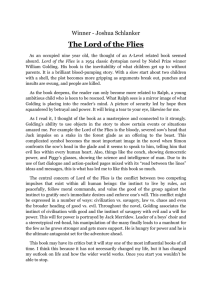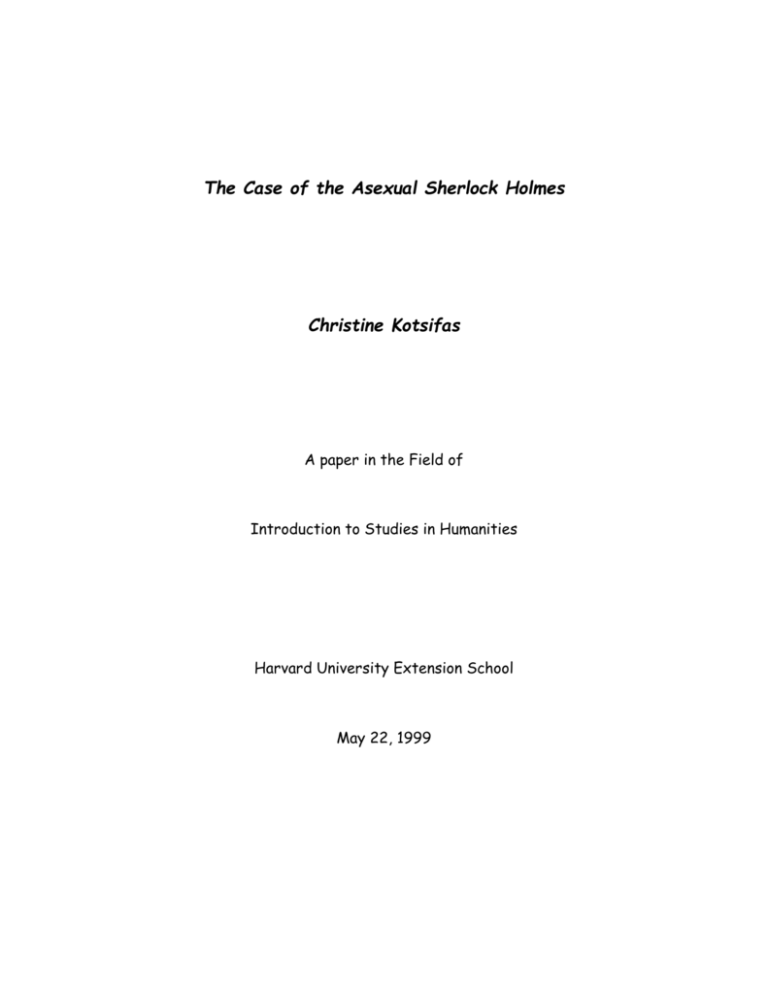
The Case of the Asexual Sherlock Holmes
Christine Kotsifas
A paper in the Field of
Introduction to Studies in Humanities
Harvard University Extension School
May 22, 1999
In many literary discussions of the Sherlock Holmes character, I notice a
reluctance to ignore the lack of detail on Sherlock Holmes' sexual relations. In
fact, some readers go so far as to suggest that Holmes' adventures were a
substitute for sex1. This suggestion leads one to believe that Holmes never had
sex, nor did he desire it – a concept many modern readers find frustrating.
Sex is such a huge part of modern life that when it is not readily apparent in
literature, readers will often come up with a reason – or convince themselves that
there is a substitute. In the case of the asexual Sherlock Holmes, suggestions
have been made that he was homosexual (and truly in love with Watson),
imposed a great amount of celibacy upon himself (supposedly to concentrate
better on his work?)2 or used his adventures as a substitute for sex3. It makes
more sense, however, that Doyle may have felt that the inclusion of sexual
escapades into the stories may have weakened the Sherlock Holmes’ character
as these desires may have been distractions from his analytical detective work.
1
Information gathered from a Harvard classroom discussion.
2
Roylott, Validity of Interpretation of Sherlokiana: A Philosophy of Art paper
(see Bibliography for citation) 3
2
Doyle did not intend for Sherlock Holmes to be homosexual, as he was attracted
to women. Take, for instance, his enamour with Irene Adler in “A Scandal in
Bohemia”.
“I only caught a glimpse of her at the moment, but she was
a lovely woman, with a face that a man might die for.”
“The bride [Irene Adler] gave me a sovereign, and I mean
to wear it on my watch-chain in memory of the occasion.”4
Holmes was obviously attracted to this woman, even going so far as to request
that a photograph of her remain in his possession after the case had been
solved.5 Further, there are no references to Holmes admiring men in a sexual
manner. Doyle did not intend for readers to view Holmes as a homosexual
character.
It is doubtful, too, that Doyle intended for Holmes to display a willfully imposed
celibacy upon himself. Denying sexual desires would take up far too much
energy, and he was not a man apply focus where it would not aid him in some
way.
3
Classroom discussion
4
Sir Conan Arthur Doyle, "A Scandal in Bohemia" The Complete Sherlock Holmes (New York,
Doubleday, 1930) 169
3
“You see,” he [Holmes] explained, “I consider that a man’s
brain originally is like a little empty attic, and you have to
stock it with such furniture as you choose. A fool takes in
all the lumber of every sort that he comes across, so that
the knowledge which might be useful to him gets crowded
out, or at best is jumbled up with a lot of other things, so
that he has a difficulty in laying his hands upon it. Now the
skillful workman is very careful indeed as to what he takes
into his brain-attic. He will have nothing but the tools which
may help him in doing his work, but of these he has a large
assortment, and all in the most perfect order. It is a
mistake to think that the little room has elastic walls and
can distend to any extent. Depend upon it there comes a
time when for every addition of knowledge you forget
something that you knew before. It is of the highest
importance, therefore, not to have useless facts elbowing
out the useful ones.”6
Forced celibacy would have most likely been a greater distraction than sex, and it
would have been uncharacteristic of Doyle’s creation to deal with sexual desire in
such a debilitating way.
5
Doyle, 175
6
Doyle, "A Study In Scarlet" 21
4
A modern reader can, of course, find ways to argue that Doyle meant for his
adventures to be a substitute for sexual gratification. In “The Adventure of the
Noble Bachelor”, Holmes greets his rival Lestrade with “a twinkle in his eye.7”
because he knows that he has already solved the case. Doyle’s character takes
a certain pleasure in his work and his abilities.
But creating the ability to derive pleasure from work does not automatically
provide the character with a substitute for sex – the one thing that the modern
reader seems to feel our fictional characters truly need. In fact, the Sherlock
Holmes character appears too preoccupied with proving scientific theories that
he does not appear to even think about sex. Even if sex did cross his mind, some
of his scientific experiments may have been sexual deterrents. As Watson says,
“[Holmes} appears to have a passion for the definite and
exact knowledge. But, it may be pushed to excess. When
it comes to beating the subjects in the dissecting-rooms
with a stick [to verify] how far bruises may be produced
after death."8
Further, Holmes’ character was too scientific to become preoccupied with a
romantic involvement. Actually, just the opposite would have been more likely – a
7
Doyle, "The Adventure of the Noble Bachelor" 295
8
Doyle, "A Study In Scarlet" 17
5
character whose hobby may have made it difficult to attract and keep many
women.
“Holmes is a little too scientific for my tastes [says
Stamford9 to Watson]– it approaches to cold-bloodedness.
I could imagine his giving a friend a little pinch of the latest
vegetable alkaloid, not out of malevolence, you
understand, but simply out of a spirit of inquiry in order to
have an accurate idea of the effects. To do him justice, I
think that he would take it himself with the same readiness.
He appears to have a passion for definite and exact
knowledge.10
Holmes preoccupation with work and his experiments are not clues to a
substitution for sex, but rather support an argument that Holmes had a low sense
of sexual desire. Doyle created Sherlock Holmes as a man of science who
focused very clearly on the specific details of life, especially within his
adventurous type of work. Doyle did not create his character to be the type of
man who would have enjoyed the responsibility of a relationship of the heart.
The fact that he never became involved with a woman shows clearly that Doyle
was not interested in having Holmes marry. It is possible, however, that Doyle
Stamford is an old acquaintance of Watson’s. His sole purpose in this story is to introduce
Watson and Sherlock Holmes.
9
10
Doyle, “A Study in Scarlet” 17
6
may have seen Holmes as the type of man who, taking a very scientific approach
to life, took a very scientific approach to dealing with sexual desires. Holmes
character was acquainted with many different social classes, including those in
the "lowest portions of the city"11. Doyle could have easily shrugged off the
sexual content by rationalizing that the character could have easily been able to
visit prostitutes, or other women who required none of the usual relationship
attentions.
Still, no mention of any affair baits the reader "into being unhealthily preoccupied
with sex"12 However, if Sherlock Holmes did have sexual relations of a more
casual nature, it would follow that Doyle would never have written them into the
stories. The Holmes' character was a gentleman, and, according to David Cody,
gentlemen would never have discussed such matters13.
Doyle most likely felt that giving Sherlock Holmes sexual desires and relations
would also give him a weakness that might interrupt Holmes' work. This
argument is not to imply that Holmes didn't have weaknesses. He did spend days
doing nothing but lounging on the couch.14 But this weakness had no effect on
11
Sir Conan Arthur Doyle, "A Study In Scarlet" The Complete Sherlock Holmes (New York,
Doubleday, 1930) 20
12
Roylott, 3
13
David Cody, The Gentleman (see Bibliography for citation) 1
14
Doyle, 14
7
his sleuthing. He did not, for instance, see a couch and immediately feel the
desire to nap. Doyle also gave his character a heroin habit. But he indulged this
habit when he was relaxing and it never seemed to interfere with the character’s
adventures. Strong sexual desires, however, can be distracting even in the most
exhilarating circumstances.
Simply, it would have been difficult for Doyle to insert too many romantic
possibilities without jeopardizing his characters’ integrity. In the prudish setting of
Victorian England, writers were already sparking, within their readers, an
introspective interest in sex. According to William Cohen:
In these years [late 1800s], prudishness drove fiction in
contradictory directions, compelling it to generate and to
prohibit discussion of sexuality. [Newspaper scandal
stories show the nineteenth-century imagination of
sexuality at its most dramatic and public.]
Doyle took great care to craft the clues that Holmes’ followed in his adventures.
Doyle would not have wanted readers to be distracted by a sudden opportunity
for romance – a distraction which could have been overwhelming due to the
nineteenth-century fascination with sex.
Having the Sherlock Holmes character take a wife would have split the
characters’ interests and focus. His
devotion would have laid in an area
8
other than his detective work. The Holmes’ character needed to be able to focus
entirely on the case at hand. Family obligations would have been too intrusive
and would have cluttered the stories.
Further, Doyle took great care to give his character very distinct traits. Ruskin, in
a passage quoted from ‘Of Queens Gardens’, defines the role of the Victorian
man.
He is eminently the doer, the creator, the discoverer, the
defender. His intellect is for speculation and invention; his
energy for adventure, for war and for conquest whenever
war is just, wherever conquest necessary.15
Ruskin’s description fits Holmes perfectly. Doyle created a man who is purely
Victorian in his role – a man’s man. He is a warrior personality set to conquer the
truth, rather than a battlefield. According to Moore and Gillette,
“[The warrior’s] loyalty is to something – a cause, a god, a
people, a task, a nation – larger than an individual.”16
Holmes’ loyalty was to the solution. Adding sexual desire into the equation would
have thinned any of these characteristics, and would have weakened the role of
15
Parker, Gender Roles and Sexuality in Victorian Literature 13
16
Moore and Gillette, King, Warrior, Magician, Lover 84
9
the character as a man, as well as a detective.
Finally, Doyle allows his reader to understand Holmes’ sexual emotions more
clearly through Watson as he introduces Irene Adler in A Scandal in Bohemia.
To Sherlock Holmes she is always the woman. I have
seldom heard him mention her under any other name. In
his eyes she eclipses and predominates the whole of her
sex. It was not that he felt any emotion akin to love for
Irene Adler. All emotions, and that one particularly, were
abhorrent to his cold, precise but admirably balanced mind.
It is in this story also, that Holmes apologizes for “[failing to bring] business to a
more successful conclusion”. As Watson remarks, this story shows
“…how the best plans of Mr. Sherlock Holmes were beaten
by a woman’s wit.”
Clearly, Doyle felt that any woman worthy of the attentions of Sherlock Holmes
would have been a worthy adversary. Doyle intended for the character to have
the ability to understand sexual desire and love, and in some small way, to feel
them (as he is obviously very fond of Adler). Says Watson,
“And when [Holmes] speaks of [Irene Adler], or when he
refers to her photograph, it
is always under the
10
honourable title of the woman.”
There is no doubt however that the Holmes character is mainly asexual, as “all
emotions [were abhorrent]. It stands to reason that Doyle did not want the
Sherlock Holmes character to be distracted by sexual interests, as to give him a
unique, strong and interesting persona.
11
Bibliography
Sherlock Holme’s Stories Consulted
Doyle, Sir Arthur Conan, "A Study in Scarlet" The Complete Sherlock Holmes
New York,
Doubleday, 1930
Doyle, Sir Arthur Conan, "A Scandal in Bohemia" The Complete Sherlock
Holmes New York,
Doubleday, 1930
Doyle, Sir Arthur Conan, "The Adventure of the Speckled Band" The
Complete Sherlock Holmes New York,
Doubleday, 1930
Doyle, Sir Arthur Conan, "The Adventure of the Noble Bachelor" The
Complete Sherlock Holmes New York,
Doubleday, 1930
Other Works Consulted
Roylott, Validity of Interpretation in Sherlockiana: A Philosophy of Art Paper
http://www.geocities.com/Athens/Acropolis/8950/validity.htm
12
Cody, David The Gentleman
stg.brown.edu/projects/hypertext/landow/victorian/history/gentleman.
Cohen, William A. Sex, Scandal and the Novel
stg.brown.edu/projects/hypertext/landow/victorian/gender/wac.html
FROM: Sex Scandal: The Private Parts of Victorian Fiction Duke University
Press 1996
Harrison, Michael, The World of Sherlock Holmes New York,
E.P. Dutton & Co., 1977
Reader, W.J., Victorian England London, B.T. Batsford, Ltd., 1973
Freeman, Kelsey English Victorian Society, 1997
http://www.geocities.com/Athens/Acropolis/8950/kelsey.htm
Landow, George P. Newman on the Gentleman
stg.brown.edu/projects/hypertext/landow/victorian/vn/victor10.html
Helsinger, Elizabeth K. The Woman Question: Defining Voices, 1837-1883
New York, Garland Publishing, Inc. 1983
Maynard, John Victorian Discourses on Sexuality and Religion New York,
13
Cambridge University Press 1993
Parker, Christopher Gender Roles and Sexuality in Victorian Literature
England, Scholar Press 1995
Moore, Robert and Gillette, Douglas King, Warrior, Magician, Lover:
Rediscovering the Archetypes of the Mature Masculine Harper San Francisco
1990
14

